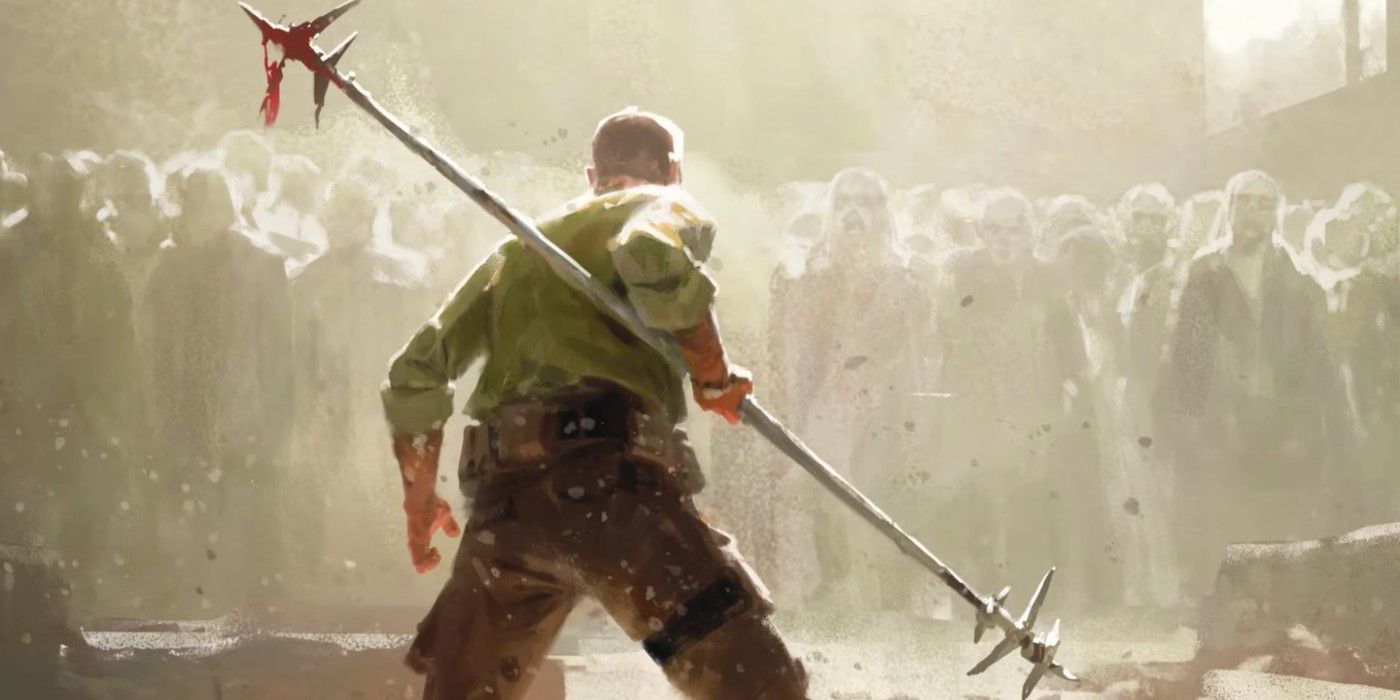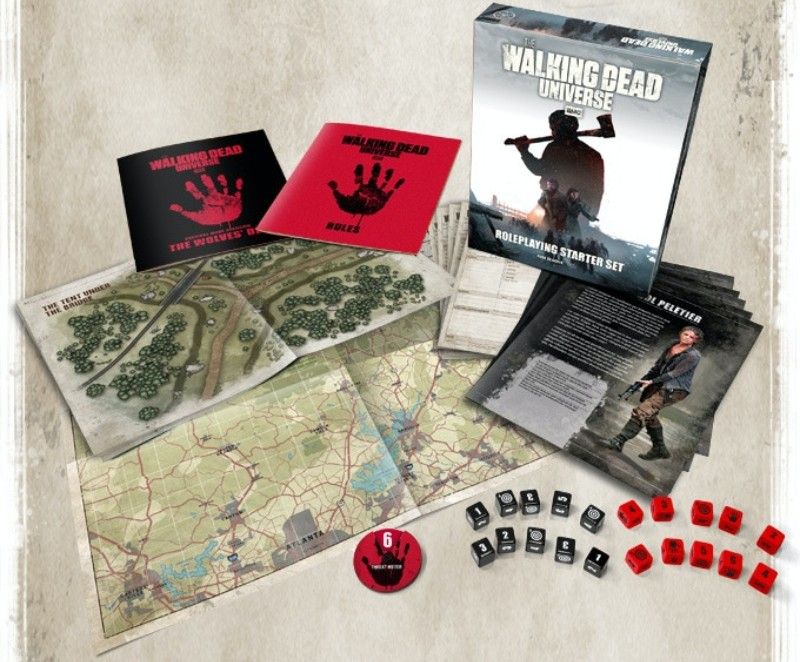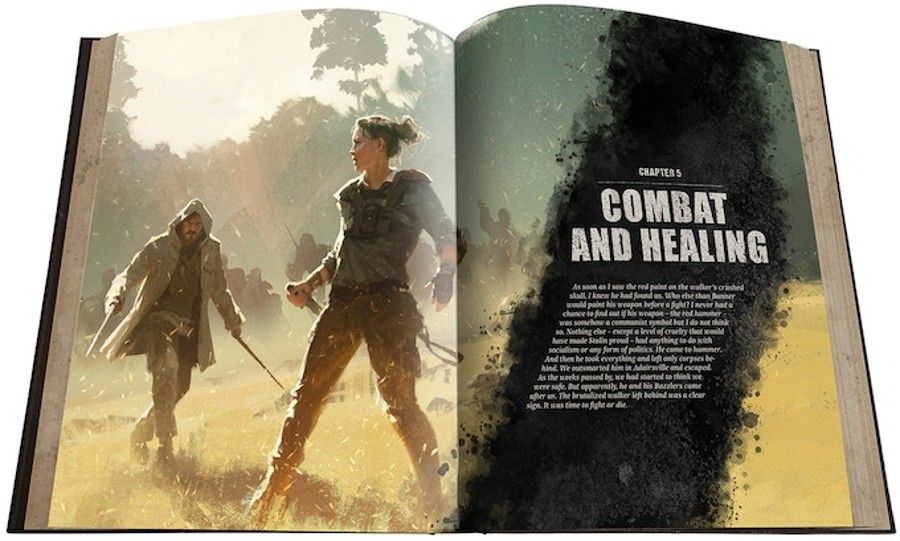The Walking Dead Universe Roleplaying Game offers a new twist on the beloved IP, giving players the chance to craft their own characters and embark on unique adventures in a tabletop format. The upcoming title is a joint effort from Free League Publishing, well-known in the TTRPG community for releases like Mörk Borg and The One Ring, Genuine Entertainment, and AMC Networks. TWD Universe RPG will focus on the world created within the television show, but the stories fans play out in-game will be entirely new.
The Walking Dead Universe RPG will offer two different ways to play: campaign mode and survival mode. Campaign mode is more malleable, with players setting their own goals and creating a narrative through impactful choices. On the other hand, survival mode centers around dangerous, pre-made scenarios included with the game that fans must tackle together. The game's rules are based on the Year Zero Engine, which players of other Free League titles will be familiar with, but they've been somewhat altered to better fit The Walking Dead Universe RPG. A Kickstarter for the game ends this week, with early access for backers beginning soon after.
Screen Rant participated in an email interview with Genuine Entertainment Game Producer and Brand Manager Joe LeFavi and Free League Publishing Game Designer and Co-owner Mattias Johnsson Haake to discuss creating a brand-new player experience with The Walking Dead Universe Roleplaying Game.
Screen Rant: Can you talk a bit about how The Walking Dead Universe Roleplaying Game has drawn inspiration from different parts of other Free League titles?
Mattias Johnsson Haake: As the lead designer of the game is Nils Hintze, best known as the designer behind the Tales from the Loop and Vaesen RPGs, you will recognize much of the core mechanic (Year Zero Engine) and rules-lite/story-first approach from his earlier works. However, TWDU RPG is its own thing, and if you are familiar with the Free League catalog you will find similarities with several other titles - the sector based exploration found in Mutant: Year Zero, the focus on faction play, and moral gray-scales also notable in Symbaroum and Coriolis, and not least the stress mechanic known from the Alien RPG. Of course, these elements become something different as part of a new whole - most notably the stress mechanic that now not only impacts single player characters, but the world around them: make a wrong move, and the ever present threat from walkers will grow, from bad to worse to run for your life.
Basically, Hintze’s aim was to create a rule set that would allow any and all events seen in the TV series to make sense in the game. We believe he has succeeded, but the true answer to that question will not be revealed until the game is out and people start playing.
One of the core components of this game is that players make their own characters, versus playing with ones already established in the show. While this is common practice for TTRPGs in general, it's not always as certain of a mechanic for big, licensed IPs - why is this element of creation so integral to how players experience the game?
Joe LeFavi: How players experience this world on their own terms, through their own POV and life experiences, is the central driving force of the game. The world of The Walking Dead is a living, breathing, ever-evolving stress test, and the most memorable and unforgiving moments are all rooted in interpersonal relationships and character development. Human drama, plain and simple. So sure, players can portray an existing TWDU character if they choose, but let’s face it. We already know what those characters are made of. We’ve seen what they’d do on the best and worst of days. If you really want to experience what TWD does best, allow it to stress test what you’re made of. In those same circumstances and then some. TWD forges characters in fire, and you’re just missing out if you don’t (at some point) dare to find your own answers to the same questions everybody in TWDU must inevitably face. Who am I really? What is the meaning and value of life? Where do I belong? What matters the most to me? And why?
What was it like balancing making something incredibly open-ended in terms of gameplay and storyline while still incorporating elements of the Walking Dead universe players know and love?
Mattias Johnsson Haake: Well, you can surely argue that TWD, to a large extent, is about the characters - how they react to and evolve under the pressure of what they experience, what they are forced to endure. And this is something that RPGs do very well: having the story emerge as a result of choices made and actions performed in the face of more or less daunting challenges. Making this particular RPG feel like a part of the Walking Dead Universe is much about the style and tone of those challenges, the particular problems and opportunities that the inhabitants of the gameworld must overcome to survive - be it approaching walker swarms, scarcity of supplies, interpersonal conflicts, warmongering strangers, or your vehicle shutting down in the middle of nowhere.
Joe LeFavi: It’s all about finding common ground. You want fans to feel like they’re playing in the world they know and love, but nobody truly wants a 1:1 regurgitation of only what they’ve seen on screen. So the balance is oftentimes found in the shared truths and experiences that both TWDU fans and anybody actually living in this fictional universe would know first-hand, and making sure those commonalities exist in a world that becomes a relatable, three-dimensional NPC all its own. Luckily, part of TWD’s mystique is how little you actually know and understand. You learn over time how walkers work. What basic necessities you need. What it means to endure and sacrifice and lose. And those truths are pretty much the same for everybody. So you try to respect those few pillars that keep this shared reality intact, and then allow players to fill in the gaps and develop their own lived-in versions of this world.
Joe LeFavi mentioned in an interview that in playtesting he's never really seen any two groups do the same thing. What are some of the most creative or crazy things you've seen players come up with in-game so far?
Joe LeFavi: Well, let’s see. You know those RPG players who always carry rope, a 10-foot pole, oil flasks, trick arrows, and a bag of marbles? They had a lot of fun. You’d be surprised how many ways you can use duct tape, fishing line, super glue, zip ties, or a wind-up alarm clock. You’d also be surprised how NO ONE ever visits a library. As soon as the internet goes away, 99% of players scream, “Oh no, all information is gone forever!” Facepalm. Speaking of which, Mattias can attest how I went off the deep end reading public domain books from the late 1800s on frontier farming, bushcraft, you name it. I’d confidently classify that as “crazy.” None of that went into the game, mind you. But I know how to amputate a leg now. So that’s fun.
Mattias Johnsson Haake: I will not go into details, but I’ve had one PC turn on another PC and try to kill them, and this happened inside the base of a hostile faction - not very creative, but definitely crazy, even if the aggressor had their reasons. In general, it is hard to single out any particular actions; what comes off as remarkable is very much decided by the in-game situation. But the cool thing about Hintze’s design is that the rules will seldom limit or dictate what is possible; basically, the player can declare what their PC wants to do, and the rules are flexible enough for the GM to come up with a way to let them give it a try.
One mechanic I think sounds very interesting is that each player will have an Issue they must deal with, and can become "shattered" from them under the right conditions. Can you describe that mechanic in a bit more detail?
Mattias Johnsson Haake: Your Issue signals a weakness or problem in your character; something that makes life extra difficult and demanding. It can be just about anything: you are hopelessly in love, you are too quick to trust people, you are a recovering addict, and so on. The GM can use your Issue to come up with challenges in the game, challenges that typically affect you and everyone else around you. It should be noted that not only PCs have Issues - also NPCs, locations, even gear can have weaknesses (some known to all, others only known to the GM) that can be turned into challenges.
If any of the PCs becomes Shattered, this is added as a new Issue for the group to handle. Basically, at the end of every game session where your PC has experienced something extra stressful or horrifying, you must roll to see if they manage to handle their fear. If the roll fails, the PC becomes Shattered - they become delusional or paranoid, they start seeing things or get a twisted vision of reality. Getting back from being Shattered is hard work, for the PC and all around them; it must be roleplayed, in sessions and scenes, how you find a way to move forward and leave the fear behind.
Joe LeFavi: This is honestly one of my favorite parts of the game. Engineering a new thematic twist for TWDU, the ever-stacking stress mechanics are no longer just about you. You must now manage the stress levels of your emotional anchors among the other survivors in your group, too. Other PCs and NPCs can’t just lose their tempers or allow their issues to get the better of them, as one reckless step or a raised voice at the wrong moment may have real consequences. For everyone. And yet given the dire circumstances, it’s only natural (dare I say unavoidable) for stress to take its toll. So this ticking clock has added a new layer of drama that relentlessly drives roleplay, as your life often depends upon maintaining your few precious relationships and being conscious of how other characters (PCs and NPCs) are feeling at any given moment.
Knowing that you, the other PCs and NPCs, even your havens and precious equipment can shatter (literally and figuratively), this stress variant has become a powerful tool during gameplay and an organic platform for table talk and player safety, too. Players in and out of character are taught to be mindful of everyone else at the table and everything in play. No one and nothing are ever truly safe or secure, so you’re encouraged to always look around at the people and places around you and ask, “Is everything okay?” That simple human question has become part of the game in more ways than one, and it was an important step for us. After all, things can get dark in TWD and confronting challenging themes or personal loss and sacrifice is inevitable. So it’s impressive how elegantly Free League gave the role of stress real utility in a way that still feels very true to what TWD does best.
After release, I know there is also a televised play series planned for the game on AMC. Can you give some insight into what fans can expect from that?
Joe LeFavi: There isn’t much more that we're allowed to share yet. To be honest, finalizing the Core Rulebook and everything we needed for the Kickstarter has been our priority for a while. It didn't make sense to produce the actual play until the game itself was ready to roll. Even still, many people behind the TWDU camera/curtain have been a part of our process since day one, helping us to understand how the world works, fact-checking canon, and exploring what we can and should do to make the best game. That true collaboration is what we hope will make for a very fun and authentic actual play, too. AMC has grand plans for TWDU, and AMC is keen to explore where we can best fit and respectfully play in our own corner of canon. So we hope to strike the right balance between celebrating who and what already fans know while still bringing something new and meaningful to the table. Literally and figuratively.
What mechanics or moments are you most excited to see potentially play out in-game during the series?
Joe LeFavi: If all stars align, the liveplay could be the first time that a lot of people see a real, unscripted tabletop RPG session in action. That’s a rare treat and a meaningful opportunity to redefine what TTRPGs are and what they do best. So I can’t wait for TWD fans to see how our players must make hard decisions right there in the moment. To share in the stakes, uncertainty, and consequences of each dice roll. To watch somebody get utterly lost in their character and deliver an impossibly awesome line of dialogue. Or pull off some inconceivable act of heroism, cunning, or fury. The laughter. The loss. The true chaos of unbridled creativity at its best. That’s what tabletop RPGs mean to me, and I’m excited that we’ve got a chance to share that and hopefully inspire more people to make TTRPGs and TWD a bigger part of their lives. So that’s what I’m the most excited about. The possibility that somebody will walk up to me at Comic-Con years from now and say, “RPGs are a huge part of my life now because I watched that show.”
Mattias Johnsson Haake: I am mostly curious to see what PCs are put into play, how they evolve over time, and how the rule set as a whole supports (or limits) this development. That said, there are a lot of roll tables in the game - for critical injuries, random encounters and locations, NPC reactions, walker appearance, and so on. Watching how the story evolves due to the outcome of rolls on such tables is always a thrill.
Is there anything else you want fans to know about The Walking Dead Universe Roleplaying Game?
Joe LeFavi: If you’ve never played a tabletop roleplaying game before, you can and will enjoy this game. And if you’ve never watched an episode of The Walking Dead, you can and will enjoy this game. We’re not only welcoming the people who have watched every episode, and we’re not expecting everybody to sink 100+ hours into an ongoing RPG campaign. May you walk a minute or a thousand miles, all we want is for you to step into this world and see for yourself what makes The Walking Dead such a rich and evocative sandbox for character-driven storytelling. Once you do, figuring out what comes next is the fun part.
Source: Free League Publishing/Kickstarter, Free League Publishing/YouTube
The Walking Dead Universe Roleplaying Game will release some time later this year. The Kickstarter for the game can be found here.



